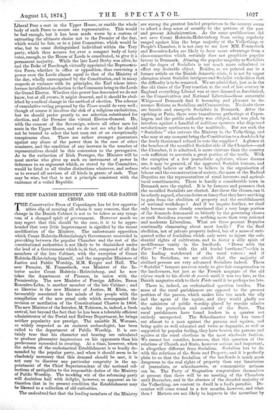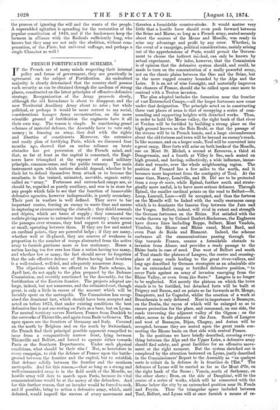THE NEW DANISH MINISTRY AND TAP, OLD DANISH
CRISIS.
THE Conservative Press of Copenhagen has let few opportu- nities slip of assuring all whom it may concern, that the change in the Danish Cabinet is not to be taken as any symp- tom of a changed spirit of government. However much we may regret that this should be the case, it is to be appre- hended that very little improvement is signified by the recent modification of the Ministry. The unfortunate opposition which Count Holstein-Holsteinborg's Government succeeded in provoking between the popular -Chamber and the rest of the constitutional authorities is not likely to be diminished under the lead of a Government which is, in fact, composed of all the members of the late Cabinet, with the exception of Count Holstein-Holsteinborg himself, and the unpopular Ministers of Justice and Public Worship, M.M. Kryger and Hall. The new Premier, M. Fonnesbeck, was Minister of the In- terior under Count Holstein - Holsteinborg, and he now takes the department of Finance, in union with the Premiership. The new Minister of Foreign Affairs, Baron Rosentirn-Lehn, is another member of the late Cabinet ; and so likewise is the new Minister of Justice, M. Klein, un- favourably associated in the minds of the people with the compilation of the new penal code which accompanied the revision or mutilation of the Constitutional Charter in 1866. The new Minister of the Interior, M. Tobiesen, is, indeed, a fresh arrival, but beyond the fact that he has been a tolerably efficient administrator of the Postal and Railway Department, he brings neither popularity nor prestige. The amiable M. Worsaae, so widely respected as an eminent archaeologist, has been called to the department of Public Worship. It is cer- tainly true that his character and bearing are calculated to produce pleasanter impressions on his Opponents than his predecessor succeeded in creating. At a time, however, when the reform of the ecclesiastical Establishment is so loudly de- manded by the popular party, and when it should seem to be absolutely necessary that this demand should be met, it is not easy to discover any particular congruity in the ap- pointment of the Chief Superintendent of the national col- lections of antiquities to the responsible duties of the Ministry of Public Worship.. The mocking wit of the reforming party will doubtless hail with delight, however, so apparent an in- timation that in its present condition the Establishment may be likened to a collection of old curiosities.
The undoubted fact that the leading members of the Ministry are among the greatest landed proprietors in the country seems to afford a deep sense of security to the patrons of the past and present Administration. As the same qualifications did not save Count Holstein-Holsteinborg from seeing regularly ranged against him the large majority of the Volkething, or People's Chamber, it is not easy to see how MM. Fonnesbeck and Rosenorn-Lehn are likely to draw more advantage from a class-connection which certainly does not propitiate popular favour in"Denmark. Abusing the popular majority as Socialists and the dupes of Socialists is not much more calculated to effect any desirable object. Besides, as we pointed out in a former article on the Danish domestic crisis, it is not by vague alarmism about Socialist intrigues and Socialist wickedness that the difficulty is to be removed. We are afraid that, just as in the fine old times of the Tory reaction at the end of last century in England everything Liberal was at once damned as Jacobinical, so the Conservatives and National Liberals—those autocratic Whigs—of Denmark find it becoming and pleasant to de- nounce Reform as Socialism and Communism. No doubt there are fanatic and energetic Socialists in Denmark. After the uprising at Paris, there were tumultuous gatherings at Copen- hagen, and the public authority was obliged, and was glad, to interfere against a handful of seditious spouters who dispensed revolutionary sentiments to the multitude. But are such the " Socialists " who outvote the Ministry in the Volkething, and who may at any moment bring the Constitution to a dead-lock by the freely threatened refusal to vote the supplies ? A glance at the benches of the so-called Socialist side of the Chamber—and the Chamber, it is admitted, is more extreme than the country —is sufficient to ascertain a great portion of the truth. With the exception of a few journalistic agitators, whose dreams are, it may be granted, of the approved Socialist texture, and who really believe or affect to believe in the organisation of labour and the reconstruction of society, the mass of the Radical Deputies are the representatives of rural interests and agricul- tural constituencies. There is hardly a considerable town in Denmark save the capital. It is by farmers and peasants that the so-called Socialists are elected. Are these the classes, can it be soberly argued, who can desire or fancy that• they have anything to gain from the abolition of property and the establishment of national workshops ? And if we inquire further, we shall only become more clearly convinced that a very large portion of the demands denounced so bitterly by the governing classes as rank Socialism amount to nothing more than very rational and moderate Liberalism. What are those peasant Deputies continually clamouring about most loudly ? For the final abolition, not of private property indeed, but of a mass of anti- quated relics of feudalism which only serve to injure the sub- stantial rights of cultivators, and to foster a silly spirit of meddlesome vanity in the landlords. " Down with the Fasts 1" " Down with the old feudal burthens!"—this is the leading watchword of the rural voters ; and if this be Socialism, we are afraid that the majority of civilised persons are very advanced Socialists indeed. These " Socialist" farmers are even ready to give fair compensation to the landowners, but just as the French magnate of the old regime stuck to his droits de corre'e until it was too late, so the Danish magnates stick to their Fdste until it he perhaps too late.
There is, indeed, an ecclesiastical question besides. The mass of the rural parishioners are opposed to the present position of the parson, which makes him too much the ally and the agent of the squire, and they would gladly see the ministers of public worship placed by regular salaries under the protection and control of the State. The rural parishioners have found leaders in a quarter not entirely unexpected. The Schoolmaster body has turned out almost to a man against the parsons and squires, and being quite as well educated and twice as dogmatic, as well as supported by popular feeling, they have beaten the parsons and squires at the rural elections in the most wholesale fashion. We cannot but consider, however, that this question of the relations of Church and State, however serious and important, is altogether different from Socialism. Socialism has to do with the relations of the State and Property, and it is perfectly plain to us that the feudalism of the landlords is much more dangerous to the real rights of property than any fanaticism of journalists, or schoolmasters, or communistic artisans can be. The Party of Stagnation congratulate themselves at present that there will be no meeting of the Chambers until December, and in the absence of the dreaded majority of the Volkething, are content to dwell in a fool's paradise. De- cember will come round in a few months, however, and what then ? Matters are not likely to improve in the meantime by the process of ignoring the will and the wants of the people. A superadded agitation is spreading for the restoration of the popular constitution of 1849, and if the landowners keep the farmers in alliance with the Radicals sufficiently long, who knows but they may see not only the abolition, without com- pensation, of the Faste, but universal suffrage, and perhaps a single Chamber as well ?































 Previous page
Previous page